10 Abr Singing Our Story
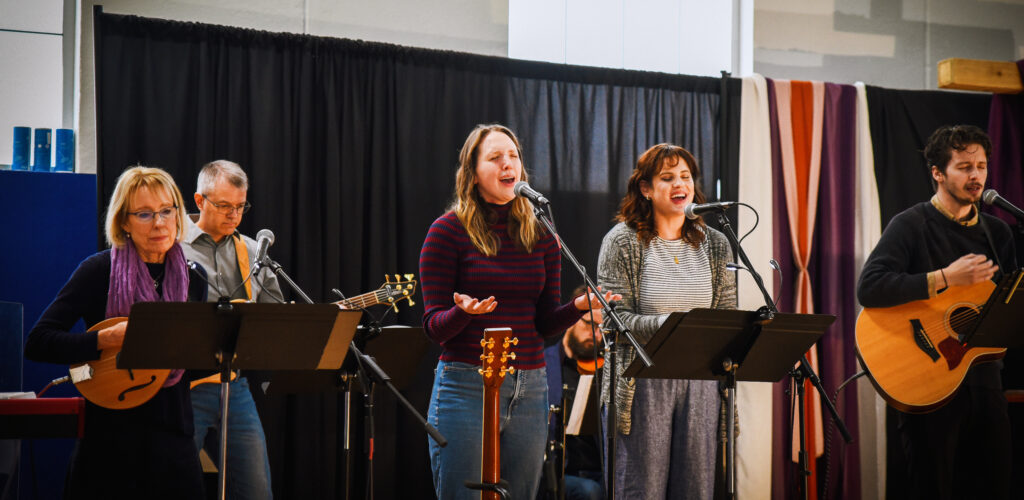
Worship at City of Light in Aurora, IL. Photo by Rachel Hoskins.
How Our Diocese Is Crafting Original Worship Music
By Clare VanderWeele
That moment when your congregation takes a collective breath before singing is ripe with anticipation—a shared heartbeat before voices rise in unison. But when the song itself has been created within your own community, something profound happens. The music becomes not just worship, but testimony—a living chronicle of your church’s journey with God.
The Gift of Local Expression
Songs germinated within a specific church family foster a deep sense of connection and identity. These homegrown compositions become part of a shared spiritual heritage.
Bonnie McMaken (above, 2nd from right) from City of Light in Aurora, IL, articulates how locally-created music serves as a spiritual marker: “Songwriting in the local church can be a profound way to raise an Ebenezer about what the Lord is doing in this specific moment.” These songs enable the congregation to reflect on those moments and fortify their faith.
Abigail Ebensberger at Immanuel Anglican in Chicago, IL, echoes this, saying, “When songs bubble up from a local gathering of the people of God, we’re putting into song a testimony of who God is and how he’s revealing himself to us.”
“When songs bubble up from a local gathering of the people of God, we’re putting into song a testimony of who God is and how he’s revealing himself to us.”
Abigail Ebensberger, Immanuel Anglican, Chicago, IL
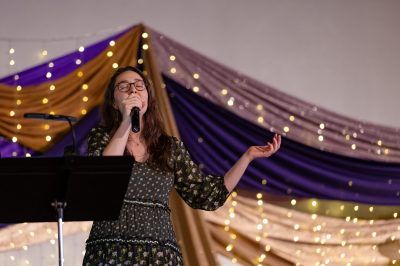
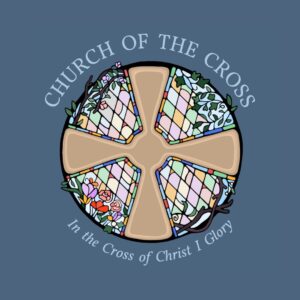
“A gift by the church, for the church”
When Church of the Cross in Hopkins, MN, celebrated their 20th anniversary, Andene O’Neil prompted them to create an anniversary album, written, recorded, and produced by their gifted musical community. Titled “In the Cross of Christ I Glory,” it captures the heart and spirit of the church family’s music while adding beauty to the Kingdom of God. It is “a gift both by the church, for the church,” Andene says.
Ultimately, these original worship songs become part of a church’s DNA. At Church of the Resurrection in Wheaton, IL, Father Steve Williamson has witnessed how original music creates a unique bond and even a type of ownership. What begins as a creative offering becomes “a common songbook,” that leads to a shared worship experience.
Songwriting as Spiritual Formation
Creating original worship music is deeply formative for worship leaders and songwriters of our diocese.
For Wilder Deitz at Bread of Life in Madison, WI, songwriting is how he explores his relationship with God, deepening his theological understanding and allowing him to creatively engage with the Word. He points to C. S. Lewis, who was “so willing to be imaginative and creative within the bounds of scripture.”
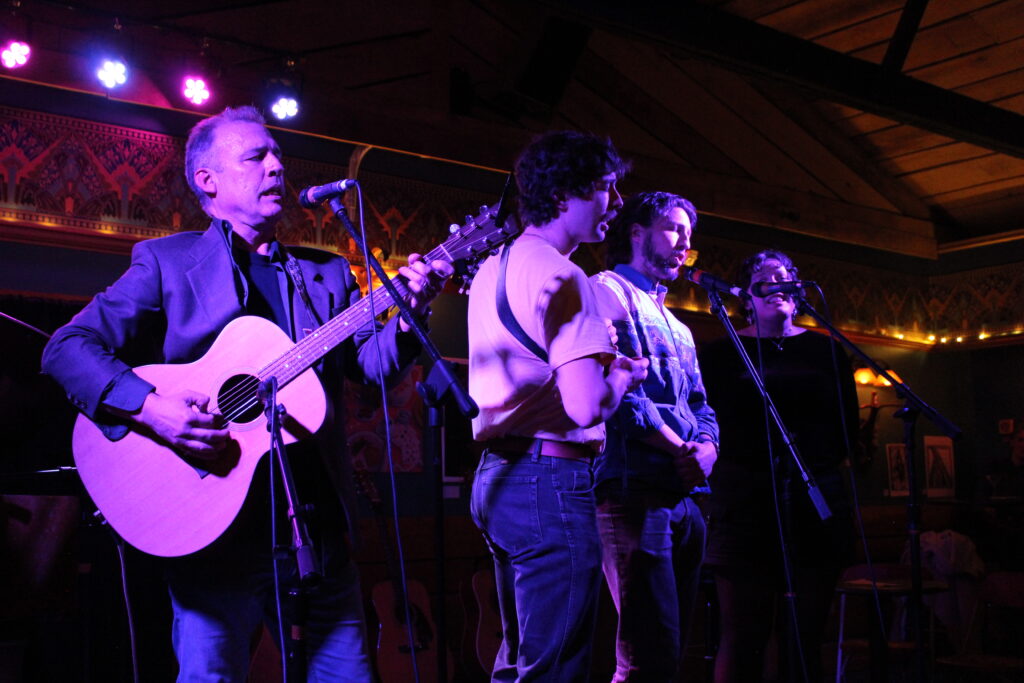
Scripture is the common thread between songwriters in our diocese. “When I steep myself in scripture,” says Abigail at Immanuel Anglican, “it saturates my mind and imagination, and it feeds the part of me that’s wired to create.”
Similarly, for Father Steve, the process of songwriting begins by contemplating scripture. He often senses the Lord calling him to a theme or specific passage, and then he translates those ideas into music. Working scripture into music has a way of “setting it so deeply in your heart, it shapes you,” he says.
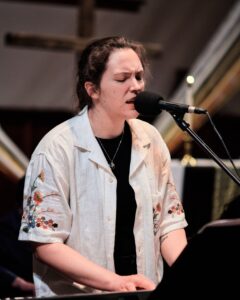
Claire Slader
Claire Slader at Cornerstone Anglican in Chicago, IL, listens attentively to how God is speaking to her through the creative process. She loves getting to “mimic my heavenly creator Father… like when a child puts on their dad’s shoes and stumbles around the house.”
The Balance of Art and Accessibility
Creating original worship music presents a unique artistic challenge: crafting something beautiful while ensuring it remains singable for an entire congregation.
“I want to put something of myself, something fresh and beautiful into making it, but also something that is unifying across lots of different people,” says Abigail at Immanuel Anglican. She describes this tension as a “dance between being specific and creative but also having a wide enough shared message that the church can sing it together.”
The surprising difficulty of this balance resonates with Bonnie at City of Light: “Writing congregational worship is so much harder than people assume. There’s such a craft to writing something theologically rich and lyrically creative yet simple and easy for the congregation to sing.“

Maddy Hunt
At Christ Church Madison in WI, Maddy Hunt describes their Sanctus arrangement as drawing inspiration from both classical music and even Beatles melodies and Radiohead chord progressions. “Different genres, colors, and flavors can produce really cool results” while remaining accessible, she says.
Meanwhile, Wilder at Bread of Life (center) attempts to guide the congregation toward a modernized stream of timeless hymns, saying “The music of Charles Wesley and Isaac Watts aren’t museum pieces; they’re living remnants of a bygone people who were worshipping the same timeless God.” He sometimes pushes the congregation to the edge of what they can absorb in the music, but they give it their best effort, helping him learn what works and what doesn’t.
The Collaborative Nature of Songwriting
The solitary songwriter hunched over a piano in isolation is rarely the reality in creating worship music. Instead, collaboration is essential.
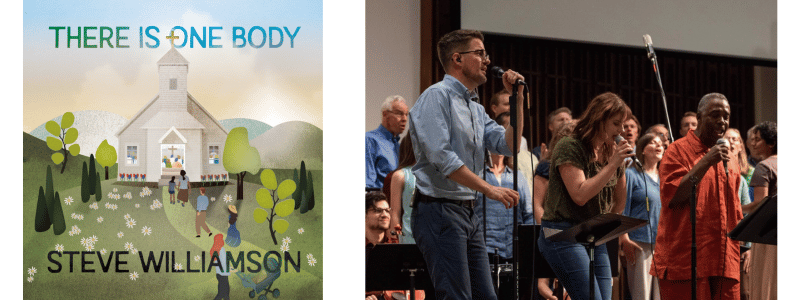
Above right: Fr. Steve, Bonnie McMaken, Dre T. Turner. Photo by Michael Johnson.
“Co-writing with other songwriters has been the way that I’ve grown most as a songwriter,” says Father Trevor McMaken at City of Light. His experience echoes Bonnie’s, who explains, “When you’re writing music for the church, letting other people into the process makes the song stronger; it will only bear fruit, even if it ends up going in a different direction.”
Abigail at Immanuel Anglican agrees and loves sharing seeds of ideas with other songwriters to create together. Collaborating with other worship leaders also helps her better understand what songs will work to sing together as a congregation.
Father Steve at Resurrection (above left) recognizes that collaboration opens the door to constructive critique. He values “trusted brothers and sisters who can give you loving critique and feedback on what’s strong and maybe what could be improved.”
Of course, that requires a lot of vulnerability, admits Maddy at Church Church Madison. “You have to know who you can work well with and share a common vision.”
The result can be powerful. The album project at Church of the Cross exemplifies large-scale collaboration, with album director Tyler Stitt noting that it resulted from “the orchestration of the Holy Spirit and the generous outpouring of many people’s gifts.”
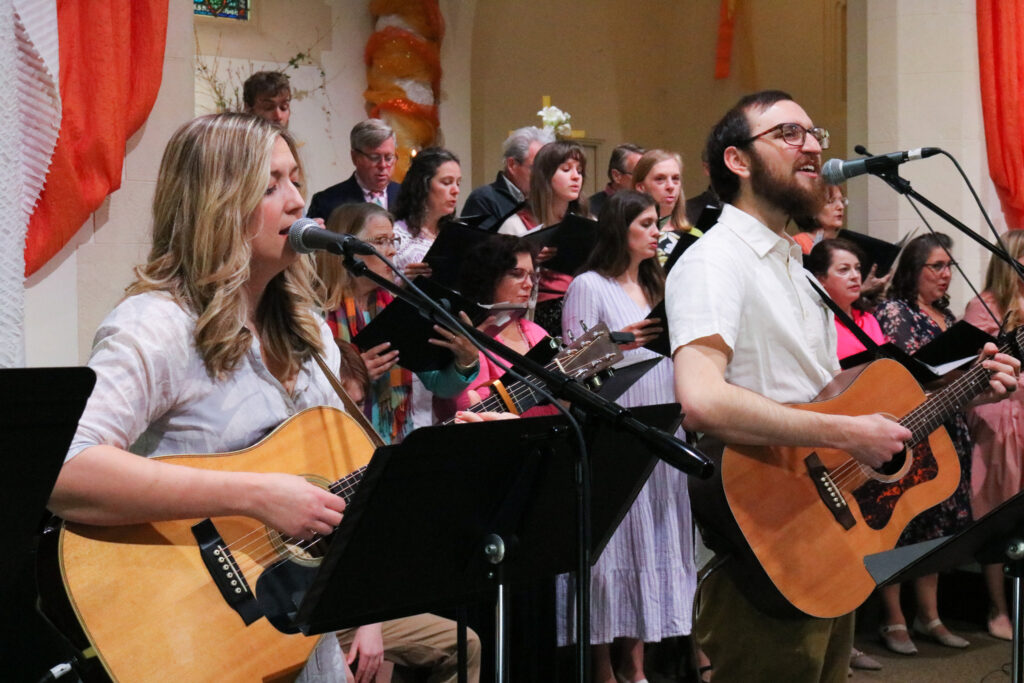
Encouragement for the Journey
Our songwriters acknowledge that creating effective worship music involves relinquishing perfectionist tendencies. Wilder candidly acknowledges that learning through doing inevitably involves mistakes, but emphasizes God’s grace and forgiveness throughout the process.
Both Claire Slader and Bonnie McMaken admit perfectionism is a common obstacle, “but don’t let perfection get in the way of the process,” Bonnie says.

Bonnie McMaken and Fr. Trevor McMaken of City of Light
But, as Maddy Hunt shares, it doesn’t have to be perfect. “I think Christians should be vibrant, hungry, prolific creators,” she says; “we respond to God and his Word” through songwriting.
“This is a gift for our congregation,” Bonnie adds, “we’re creating something beautiful for the Lord and his Church, no matter how simple and humble. Bring glory to the Lord and bless the people of God.”
“We need it. Do it,” Maddy echoes.
Music as Testimony
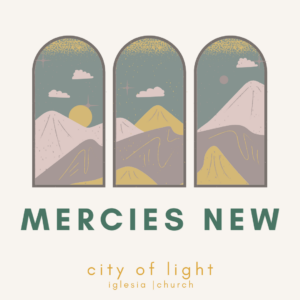 Original worship music not only expresses our theology and gathers our voices in worship, but ultimately becomes a sacred vessel carrying our collective story—bearing witness to both our struggles and God’s faithfulness through seasons of both joy and grief.
Original worship music not only expresses our theology and gathers our voices in worship, but ultimately becomes a sacred vessel carrying our collective story—bearing witness to both our struggles and God’s faithfulness through seasons of both joy and grief.
City of Light’s song “Mercies New (Lamentations 3)” emerged from a season of waiting and uncertainty, but transcended into a comfort for many congregants facing their own struggles. Claire from Cornerstone witnessed how her song about grief and isolation unexpectedly resonated with others struggling to articulate similar emotions. At Christ Church Madison, Maddy has seen this work in surprising ways—from her worship song “For Us a King” that brings her to tears years later, to a folk piece that repeatedly comforted a recent widow.
The enduring legacy of locally-written worship music extends beyond immediate impact into generational memory. John Fawcett from Church of the Resurrection passed away in 2008, yet his liturgical songs written in the late nineties continue to resonate within the congregation. His musical offerings live on, demonstrating how these songs can outlast their creators and become part of a church’s ongoing story.

Clare VanderWeele is a member of Church of the Resurrection and lives in Wheaton with her husband Mike and three children. A writer at heart and a lover of words and books, she works as VP of Marketing for a digital marketing agency.
Spotify Playlist
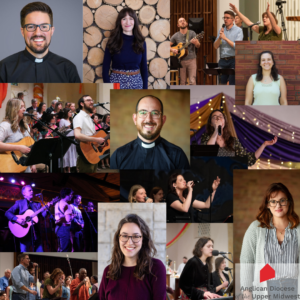
Listen to the diocesan playlist on Spotify here.